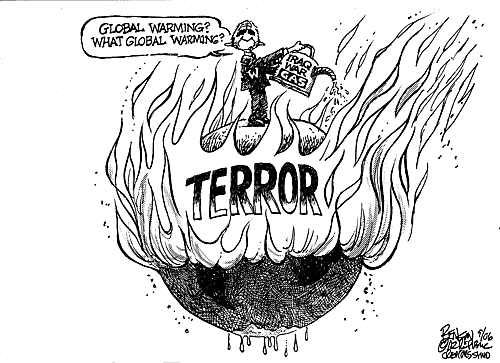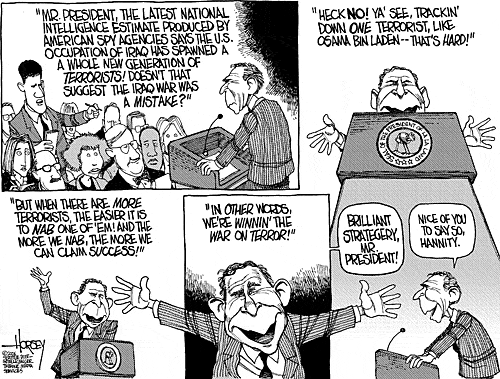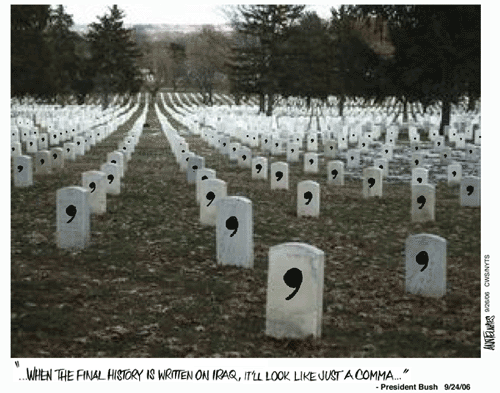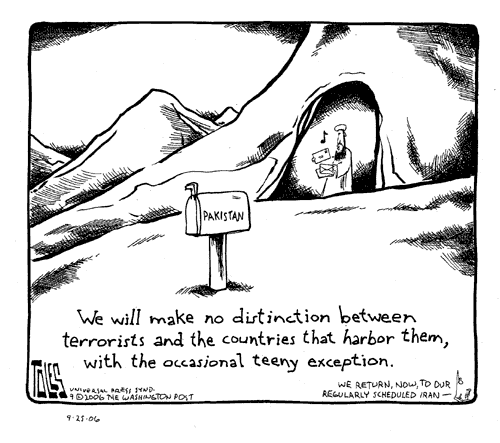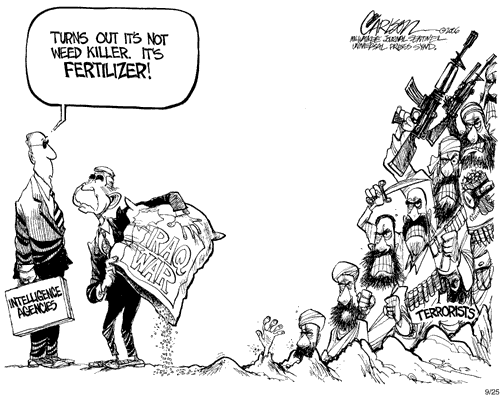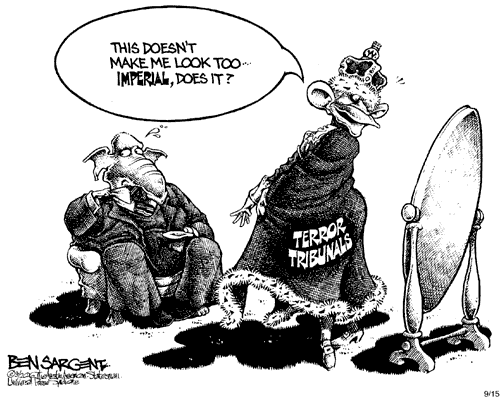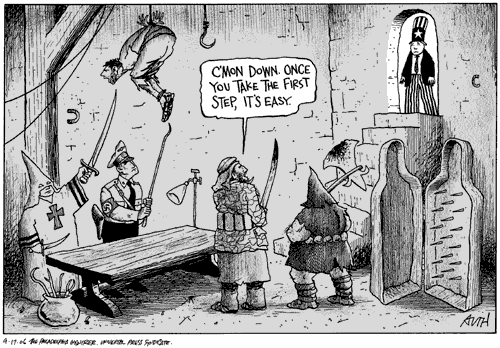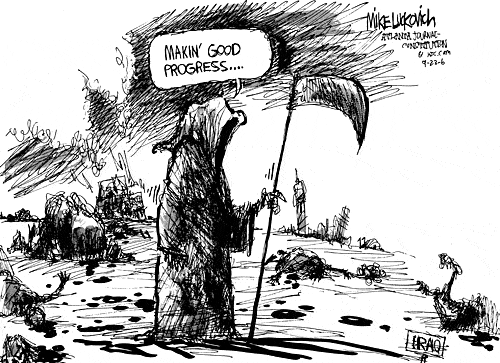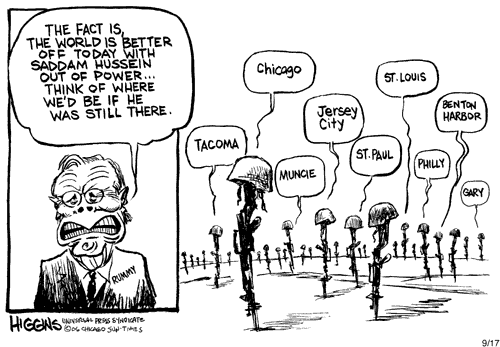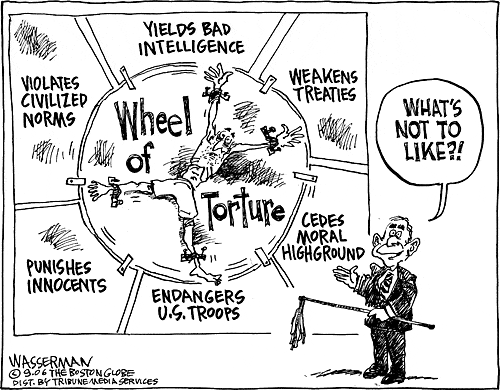WASHINGTON, Sept. 28 — The White House ignored an urgent warning in September 2003 from a top Iraq adviser who said that thousands of additional American troops were desperately needed to quell the insurgency there, according to a new book by Bob Woodward, the Washington Post reporter and author. The book describes a White House riven by dysfunction and division over the war.
The warning is described in “State of Denial,” scheduled for publication on Monday by Simon & Schuster. The book says President Bush’s top advisers were often at odds among themselves, and sometimes were barely on speaking terms, but shared a tendency to dismiss as too pessimistic assessments from American commanders and others about the situation in Iraq.
As late as November 2003, Mr. Bush is quoted as saying of the situation in Iraq: “I don’t want anyone in the cabinet to say it is an insurgency. I don’t think we are there yet.”
Secretary of Defense Donald H. Rumsfeld is described as disengaged from the nuts-and-bolts of occupying and reconstructing Iraq — a task that was initially supposed to be under the direction of the Pentagon — and so hostile toward Condoleezza Rice, then the national security adviser, that President Bush had to tell him to return her phone calls. The American commander for the Middle East, Gen. John P. Abizaid, is reported to have told visitors to his headquarters in Qatar in the fall of 2005 that “Rumsfeld doesn’t have any credibility anymore” to make a public case for the American strategy for victory in Iraq.
The book, bought by a reporter for The New York Times at retail price in advance of its official release, is the third that Mr. Woodward has written chronicling the inner debates in the White House after the Sept. 11 attacks, the invasion of Afghanistan, and the subsequent decision to invade Iraq. Like Mr. Woodward’s previous works, the book includes lengthy verbatim quotations from conversations and describes what senior officials are thinking at various times, without identifying the sources for the information.
Mr. Woodward writes that his book is based on “interviews with President Bush’s national security team, their deputies, and other senior and key players in the administration responsible for the military, the diplomacy, and the intelligence on Iraq.” Some of those interviewed, including Mr. Rumsfeld, are identified by name, but neither Mr. Bush nor Vice President Dick Cheney agreed to be interviewed, the book says.
Robert D. Blackwill, then the top Iraq adviser on the National Security Council, is said to have issued his warning about the need for more troops in a lengthy memorandum sent to Ms. Rice. The book says Mr. Blackwill’s memorandum concluded that more ground troops, perhaps as many as 40,000, were desperately needed.
It says that Mr. Blackwill and L. Paul Bremer III, then the top American official in Iraq, later briefed Ms. Rice and Stephen J. Hadley, her deputy, about the pressing need for more troops during a secure teleconference from Iraq. It says the White House did nothing in response.
The book describes a deep fissure between Colin L. Powell, Mr. Bush’s first secretary of state, and Mr. Rumsfeld: When Mr. Powell was eased out after the 2004 elections, he told Andrew H. Card Jr., the White House chief of staff, that “if I go, Don should go,” referring to Mr. Rumsfeld.
Mr. Card then made a concerted effort to oust Mr. Rumsfeld at the end of 2005, according to the book, but was overruled by President Bush, who feared that it would disrupt the coming Iraqi elections and operations at the Pentagon.
Vice President Cheney is described as a man so determined to find proof that his claim about weapons of mass destruction in Iraq was accurate that, in the summer of 2003, his aides were calling the chief weapons inspector, David Kay, with specific satellite coordinates as the sites of possible caches. None resulted in any finds.
Two members of Mr. Bush’s inner circle, Mr. Powell and the director of central intelligence, George J. Tenet, are described as ambivalent about the decision to invade Iraq. When Mr. Powell assented, reluctantly, in January 2003, Mr. Bush told him in an Oval Office meeting that it was “time to put your war uniform on,” a reference to his many years in the Army.
Mr. Tenet, the man who once told Mr. Bush that it was a “slam-dunk” that weapons of mass destruction existed in Iraq, apparently did not share his qualms about invading Iraq directly with Mr. Bush, according to Mr. Woodward’s account.
Mr. Woodward’s first two books about the Bush administration, “Bush at War” and “Plan of Attack,” portrayed a president firmly in command and a loyal, well-run team responding to a surprise attack and the retaliation that followed. As its title indicates, “State of Denial” follows a very different storyline, of an administration that seemed to have only a foggy notion that early military success in Iraq had given way to resentment of the occupiers.
The 537-page book describes tensions among senior officials from the very beginning of the administration. Mr. Woodward writes that in the weeks before the Sept. 11 attacks, Mr. Tenet believed that Mr. Rumsfeld was impeding the effort to develop a coherent strategy to capture or kill Osama bin Laden. Mr. Rumsfeld questioned the electronic signals from terrorism suspects that the National Security Agency had been intercepting, wondering whether they might be part of an elaborate deception plan by Al Qaeda.
On July 10, 2001, the book says, Mr. Tenet and his counterterrorism chief, J. Cofer Black, met with Ms. Rice at the White House to impress upon her the seriousness of the intelligence the agency was collecting about an impending attack. But both men came away from the meeting feeling that Ms. Rice had not taken the warnings seriously.
In the weeks before the Iraq war began, President Bush’s parents did not share his confidence that the invasion of Iraq was the right step, the book recounts. Mr. Woodward writes about a private exchange in January 2003 between Mr. Bush’s mother, Barbara Bush, the former first lady, and David L. Boren, a former chairman of the Senate Intelligence Committee and a Bush family friend.
The book says Mrs. Bush asked Mr. Boren whether it was right to be worried about a possible invasion of Iraq, and then to have confided that the president’s father, former President George H. W. Bush, “is certainly worried and is losing sleep over it; he’s up at night worried.”
The book describes an exchange in early 2003 between Lt. Gen. Jay Garner, the retired officer Mr. Bush appointed to administer postwar Iraq, and President Bush and others in the White House situation room. It describes senior war planners as having been thoroughly uninterested in the details of the postwar mission.
After General Garner finished his PowerPoint presentation — which included his plan to use up to 300,000 troops of the Iraqi Army to help secure postwar Iraq, the book says — there were no questions from anyone in the situation room, and the president gave him a rousing sendoff.
But it was General Garner who was soon removed, in favor of Mr. Bremer, whose actions in dismantling the Iraqi army and removing Baathists from office were eventually disparaged within the government.
The book suggests that senior intelligence officials were caught off guard in the opening days of the war when Iraqi civilian fighters engaged in suicide attacks against armored American forces, the first hint of the deadly insurgent attacks to come.
In a meeting with Mr. Tenet of the Central Intelligence Agency, several Pentagon officials talked about the attacks, the book says. It says that Mr. Tenet acknowledged that he did not know what to make of them.
Mr. Rumsfeld reached into political matters at the periphery of his responsibilities, according to the book. At one point, Mr. Bush traveled to Ohio, where the Abrams battle tank was manufactured. Mr. Rumsfeld phoned Mr. Card to complain that Mr. Bush should not have made the visit because Mr. Rumsfeld thought the heavy tank was incompatible with his vision of a light and fast military of the future. Mr. Woodward wrote that Mr. Card believed that Mr. Rumsfeld was “out of control.”
The fruitless search for unconventional weapons caused tension between Vice President Cheney’s office, the C.I.A. and officials in Iraq. Mr. Woodward wrote that Mr. Kay, the chief weapons inspector in Iraq, e-mailed top C.I.A. officials directly in the summer of 2003 with his most important early findings.
At one point, when Mr. Kay warned that it was possible the Iraqis might have had the capability to make such weapons but did not actually produce them, waiting instead until they were needed, the book says he was told by John McLaughlin, the C.I.A.’s deputy director: “Don’t tell anyone this. This could be upsetting. Be very careful. We can’t let this out until we’re sure.”
Mr. Cheney was involved in the details of the hunt for illicit weapons, the book says. One night, Mr. Woodward wrote, Mr. Kay was awakened at 3 a.m. by an aide who told him Mr. Cheney’s office was on the phone. It says Mr. Kay was told that Mr. Cheney wanted to make sure he had read a highly classified communications intercept picked up from Syria indicating a possible location for chemical weapons.
Mr. Woodward and a colleague, Carl Bernstein, led The Post’s reporting during Watergate, and Mr. Woodward has since written a string of best sellers about Washington. More recently, the identity of Mr. Woodward’s Watergate source known as Deep Throat was disclosed as having been W. Mark Felt, a senior F.B.I. official.
In late 2005, Mr. Woodward was subpoenaed by the special prosecutor in the C.I.A. leak case. He also apologized to The Post’s executive editor for concealing for more than two years that he had been drawn into the scandal.
